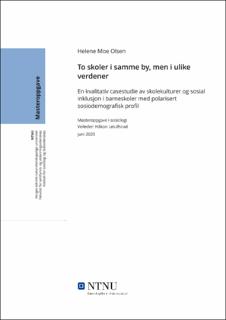| dc.contributor.advisor | Leiulfsrud, Håkon | |
| dc.contributor.author | Olsen, Helene Moe | |
| dc.date.accessioned | 2021-09-28T17:32:29Z | |
| dc.date.available | 2021-09-28T17:32:29Z | |
| dc.date.issued | 2020 | |
| dc.identifier | no.ntnu:inspera:54600024:1786168 | |
| dc.identifier.uri | https://hdl.handle.net/11250/2784509 | |
| dc.description.abstract | Formålet med masteroppgaven er å studere hvordan skoler som befinner seg i ulike sosiodemografiske områder forstår sosial inklusjon i en skolekontekst, og hvordan disse skolene tilpasser seg sine sosiale og organisatoriske omgivelser. Oppgaven bygger på 15 dybdeintervju gjennomført i 2002 og 2019/2020 med lærere og spesialpedagoger ved to skoler i en større norsk by.
For å belyse skolenes prioriteringer i inklusjonsarbeidet bruker jeg Arfwedsons teori om skolekulturer, mens skoleorganisasjonens kommunikasjon med andre system analyseres fra et systemteoretisk perspektiv. Analysen viser at skolen i høystatusområdet har en skolekultur som er faglig orientert, med en snever forståelse av hva som er «normalt». Skolen er tuftet på en organisatorisk identitet forankret i lange tradisjoner. På skolen i lavstatusområdet er arbeidet med sosial inklusjon særlig vektlagt, hvor forskjellighet og ulikhet omfavnes. Kontrasten mellom skolenes orientering mot henholdsvis elevenes faglige og sosiale utvikling manifesterer seg i skolenes inklusjonspraksiser. Økt tidspress og arbeidsomfang medfører også et større prioriteringspress i lærerhverdagen. Skolekulturen legger derfor sterke føringer på lærernes arbeid med sosial inklusjon.
Skolenes arbeid med sosial inklusjon er forbausende stabil basert på det som fremkommer av intervjuene i år 2002 og i 2019/2020. Det er derfor ikke gitt at skolenes kontekstfaktorer knyttet til endring i områdenes sosiodemografiske sammensetning og kommunale eller nasjonale mål og retningslinjer, uten videre overføres til den enkelte skoles praksis og skolekultur. Selv om skolene gjennom sin organisering og kultur potensielt kan bidra til å reprodusere sosiale klasseforskjeller, så finnes det likevel sterke sosiale fellesskap som er tilpasset elevgruppens behov ved begge skolene. Det er derfor mye som tyder på at skolens verdifulle arbeid med sosial inklusjon underkommuniseres i sosiologisk kontekst. | |
| dc.description.abstract | The aim of this master thesis is to study the way schools located in different sociodemographic areas understand social inclusion in a school context, and how these schools adapt to their environment. The work is based on 15 in depth interviews with teachers and special educators at two schools, performed in 2002 and in 2019/2020.
Arfwedson’s theory on school culture is used to shed light on how the schools prioritize their work with inclusion, while the school organization’s communication with other systems is analyzed in a system theoretical view.
The analysis shows that the school in the socioeconomically privileged area has a school culture focused on academic performance and a narrow understanding of what is considered “normal”. The school is based on an organizational identity anchored in long traditions. The school in the less privileged area prioritizes social competence and social inclusion highly. Diversity and inequality is here embraced. The contrast between the schools’ orientation towards the students’ academic and social development is manifested in their practical work of social inclusion. Increased time constraints and expanded scope of work contribute a higher pressure on prioritization in the teachers’ daily work. As a result school culture has a stronger influence on teachers’ work with social inclusion.
The schools’ orientation and understanding of social inclusion has been remarkably stable, based on the interviews in 2002 and 2019/2020. Therefore, it is not given that context factors connected to changes in the school’s environment and in local and national general requirements have a significant effect on individual school cultures.
Even though the culture and the structure of the schools potentially can contribute in reproduction of social differences, there is nevertheless a sense of community suited to the needs of the students at both schools. This indicates that the valuable work the schools do regarding social inclusion is undercommunicated in a sociological context. | |
| dc.language | | |
| dc.publisher | NTNU | |
| dc.title | To skoler i samme by, men i ulike verdener: En kvalitativ casestudie av skolekulturer og sosial inklusjon i barneskoler med polarisert sosiodemografisk profil | |
| dc.type | Master thesis | |
